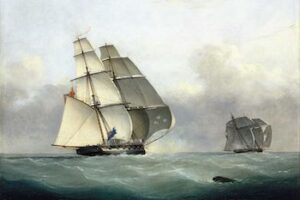
The West Africa Squadron
*This date, in 1808, affirms the West Africa Squadron was formed. They were a regiment of the British Royal Navy.
Also known as the Preventative Squadron, its goal was to suppress the Atlantic slave trade by patrolling the coast of West Africa. Formed after the British Parliament passed the Slave Trade Act 1807 and based out of Portsmouth, England, it remained an independent command until 1856 and then again from 1866 to 1867.
The impact of the Squadron is mixed, with some describing it as having a significant role in ending the slave trade and others describing poorly resourced and plagued by corruption. Sailors in the Royal Navy considered it one of the worst postings due to the high levels of tropical disease. Throughout its operations, it managed to capture around 6% of the transatlantic slave ships and freed around 150,000 Africans. Between 1830 and 1865, almost 1,600 sailors died during duty with the Squadron, principally of disease.
On March 25, 1807, Britain formally abolished the slave trade, prohibiting British subjects from trading in enslaved people, crewing slave ships, sponsoring slave ships, or fitting out slave ships. The Act also included a clause allowing the seizure of ships without slave cargoes on board but equipped to trade in enslaved people. The task of enforcing the Act was huge and challenging. To enforce this ruling in 1808, the Admiralty dispatched two vessels to police the African Coast. In the context of the ongoing Napoleonic Wars, the small British force could stop any ship bearing the flag of an enemy nation, making suppression activities much easier.
Portugal, however, was one of the largest slave-trading nations and Britain's ally against France. In February 1810, under diplomatic pressure, Portugal signed a convention that allowed British ships to police Portuguese shipping, meaning Portugal could only trade in enslaved people from its African possessions. While liberated slaves were returned to Africa, those from inland regions could not be returned to their place of origin.
They often suffered in appalling conditions on the return voyage or while waiting for courts to adjudicate their case. It is estimated as many as 25 percent of those who could not be returned to their place of origin died before being released. Some freed slaves joined the Royal Navy or the West India Regiments. Also, 35,850 recruited enslaved people were transported to work in the West Indies, nominally as apprentices. Criticism
Howard W. French has argued that the impact of the Squadron has been overstated, calling it a "central prop" in encouraging a positive image of British history instead of "remorse or even meaningful dialogue about their slave-trading and plantation-operating past." Mary Wills of the Wilberforce Institute for the Study of Slavery and Emancipation noted that the Squadron was "bound to ideas of humanitarianism but also increasing desires for expansion and intervention" and noted that it "depended on Africans for the day-to-day operation of their activities" notably the Kru and Grebo people.
The West Africa Squadron seized approximately 1,600 ships involved in the slave trade and freed 150,000 enslaved people aboard these vessels between 1807 and 1860. Robert Pape and Chaim Kaufmann have declared the Squadron the most expensive international moral action in modern history.